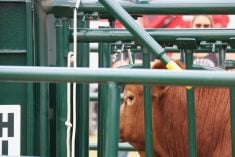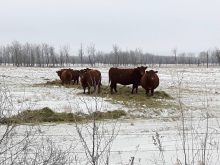Once Iben and Shirley Workentoohard realized they didn’t want to retire and sell the farm, taking the next steps to organize their estate was much simpler
Iben and Shirley Worken-toohard called us up again last week. Iben couldn’t wait to fill us in. Shirley had agreed that they would continue farming. They’re enjoying their farming career too much to consider starting to wind down and manage their tax liability as sole proprietors.
Iben and Shirley decided that they had worked too hard to establish the farm to just sell it and pay the tax. Even if their sons Luvtawacha and Nebergona decide to stay in their off-farm careers. Iben and Shirley decided they want to pass on assets and the family business, not just simple cheques. Their worry is that their legacy will last only as long as the cash. Their grandchildren and great grandchildren won’t even know their names, let alone what Iben and Shirley spend their entire lives working to build.
Read Also

Cereal lodging isn’t just a nitrogen problem
Lack of copper in the soil can also lead wheat and other cereal crops to lodge during wet seasons on the Canadian Prairies.
The bottom line for Iben and Shirley was that they don’t ever want the land sold. They were not willing to spend time or effort thinking of ways to generate more cash from the sale of something they don’t want to sell. They wanted to create an environment that would allow for smooth transition of management to the next generation. They also want to ensure that their legacy is not a burden on the next generation. They never want anyone in the family to feel trapped by ownership in the family farm.
Incorporation
This left Iben and Shirley comfortable in their decision to incorporate the business and continue farming. This was primarily driven by their desire to manage their taxable farm income in combination with off-farm income such as Registered Retirement Savings Plans (RRSPs), investment earnings, and Old Age Security.
They decided to roll their partnership interest into a corporation that includes all their farm assets, including their land. Doing this before they turn 65 will help them avoid the Old Age Security clawback. In addition, it will allow them to take out RRSPs — they plan to live off the proceeds for the next few years.
Iben and Shirley plan to leave the farm profits within the company and purchase some new equipment to ensure they will be able continue farming as long as possible.
Putting land into the company accomplishes their goal of leaving a lasting legacy. Their farm will, hopefully, remain intact within the family. They are unsure if anyone will farm in the future, however the structure allows them to delay any decision to sell the farm.
In their estate plan, they’ll leave an equitable stake in their estate to each of their children. The nature of that stake will depend each child’s future involvement in the farm. Children that decide to farm will receive common shares in the company; non-farming children will receive life insurance proceeds and any remaining investments. The common thread tying the family together will be the preferred shares notes payable and shareholder loans. If no one in the next generation wants to farm, ownership will be split equally.
Given that there is strong equity in the farm, it can fund the estate plan internally with little reliance on long-term life insurance. The key to using this equity is a clear understanding of everyone’s position and options. This is made clear through the use of a unanimous shareholders agreement. A unanimous shareholders agreement sets out the rules by which that equity stake in a company can be sold, transferred or redeemed. The clearer the unanimous shareholder agreement and the better the communication within the family, the less the estate plan will rely on life insurance to mitigate the risk of family disagreement following death.
The moral of this story: before preparing your estate plan you must clearly understand your retirement goals, how you will fund them, and how you wish your estate plan to affect your successors. Don’t forget that there is nothing wrong with a retirement plan in which you decide not to retire at all. †














